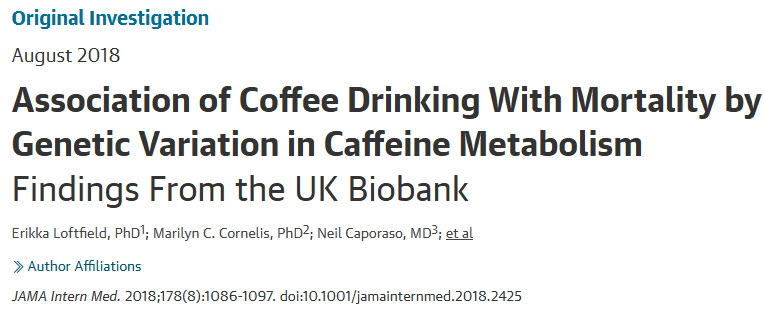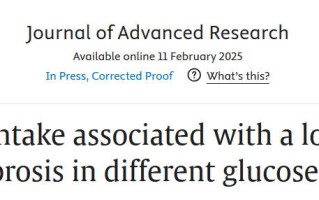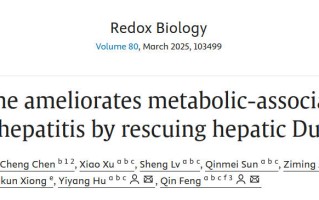2018年7月2日,《美国医学会杂志》子刊JAMA Internal Medicine权威发布了以上科学大发现。

咖啡是世界上最普遍的消费饮品之一。喝咖啡的好处,曾经喜报连连。
曾经有过报道:喝咖啡的好处,可以减少慢性疾病, 包括:心血管病[1,2]、糖尿病[3]、帕金森病[4]、肝病[5]、结直肠癌[6]和子宫内膜癌[7]等;也有很多报道:喝咖啡与全因死亡率、死于特定疾病的风险负相关[8-16]。不过,这些发现,多数是强调适度喝咖啡的好处,每天不超过5杯。
喝咖啡还曾被写入了指南。2015 版美国膳食指南顾问委员会(US Dietary Guidelines Advisory Committee)曾经报告说,适度喝咖啡——每天5杯八盎司容量杯咖啡,可以作为健康饮食的一部分[17]
尽管如此,关于喝咖啡对健康的影响,人们仍然心存疑虑。一方面,咖啡里的主要成分——咖啡因, 是众人挥之不去的健康阴霾,因为每个人体质不一样,对咖啡因代谢快慢不一,个体差异很明显。另一方面,人们普遍还是很担心,过度喝咖啡(每天喝≥6杯) 可能对健康不利。
主成分咖啡因,并非决定性因子
而本次JAMA Internal Medicine最新报告中,近50万英国成年人大样本随访10年的结果,为喜欢喝咖啡的人们,吃了颗“健康定心丸”,喝咖啡被视为健康饮食的内容,更加“铁证如山”了。在随访10年期间,喝咖啡的人比不喝咖啡的人,死亡率轻度降低10%~15%,且这一获益没有受到喝咖啡量、咖啡因代谢基因状态的影响。更值得一提的是,喝速溶粉末低咖啡因咖啡,延长寿命的作用更明显。喝咖啡也并没有增加死于心脏病和高血压相关死亡风险。
这些发现,提示咖啡里饱受诟病的主成分咖啡因,并不是延年益寿的决定性因素。咖啡里有过千种化学物质,包括抗氧化物,其对于延年益寿的作用,可能来自于咖啡里的非咖啡因物质。人们对于喝咖啡的延年益寿潜能,仍然在持续探索之中。
目前来看,喝咖啡纳入健康饮食内容,可以让酷爱喝咖啡的人,喝得比以前任何时候更加舒心,这点确实获得了越来越多的证据支持。尽管如此,但并不意味着喝咖啡是保持年轻的基础,也不是说要鼓励原本不喝咖啡的人开始喝咖啡。
酷爱喝咖啡的人,对喝咖啡量的健康把控,是个“老大难”。
实际上,2017年《美国内科学年鉴》(Annalsof Internal Medicine)也发布了关于喝咖啡改善健康的权威证据。不过和其他历史数据一样,基本都强调每日限量约5杯咖啡,有利于改善肝功能、血糖和炎症,也有利于降低过早死亡风险,包括降低死于消化病和循环系统疾病的风险等。如果每日超过5杯咖啡,历史数据显示可能就会使自己处于各类健康风险之中。
每日限量约5杯咖啡,真的有必要吗?
JAMA Internal Medicine刚刚报告的证据,可能动摇了这一标准。喝咖啡对降低死亡风险的益处,似乎并不受喝咖啡量的影响。哪怕每日喝8杯以上咖啡,仍观察到可能“延年益寿”。
总之,综合目前的证据,人们不必因为喝咖啡,而感到对健康的畏罪感。人们也不必过分担心,而经常试图限制咖啡消费量了。
一杯咖啡真的很神奇。早晨喝一杯热气腾腾的咖啡,可以帮助你提起精神面对新的一天;午后一杯冰咖啡,会让你从午后的炎热中振作起来;饭后一杯温咖啡,可帮助消化。尽情享受或许并无妨。
参考资料:
1. Long-term coffee consumption and risk of cardiovascular disease: a systematic review and a dose-response meta-analysis of prospective cohort studies. Circulation. 2014;129(6):643-659.
2. Coffee consumption and risk of stroke: a dose-response meta-analysis of prospective studies. Am J Epidemiol. 2011;174(9): 993-1001.
3. Caffeinated and decaffeinated coffee consumption and risk of type 2 diabetes: a systematic review and a dose-response meta-analysis. Diabetes Care. 2014;37(2):569-586.
4. Caffeine intake, smoking, and risk of Parkinson disease in men and women. Am J Epidemiol. 2012;175(11):1200-1207.
5. Coffee reduces risk for hepatocellular carcinoma: an updated meta-analysis. Clin Gastroenterol Hepatol. 2013;11(11):1413-1421.e1.
6. Association of coffee consumption with risk of colorectal cancer: a meta-analysis of prospective cohort studies. Oncotarget. 2017;8(12):18699-18711.
7. Coffee consumption and risk of endometrial cancer: a dose-response meta-analysis of prospective cohort studies. Sci Rep. 2015;5:13410.
8. Associations of coffee drinking and cancer mortality in the Cancer Prevention Study-II. Cancer Epidemiol Biomarkers Prev. 2017;26(10):1477-1486.
9. Association of coffee consumption with total and cause-specific mortality among nonwhite populations. Ann Intern Med. 2017;167(4):228-235. 10. Gunter MJ, Murphy N, Cross AJ, et al. Coffee drinking and mortality in
10 European countries: a multinational cohort study. Ann Intern Med. 2017; 167(4):236-247.
11. Association of coffee drinking with total and cause-specific mortality. N Engl J Med. 2012; 366(20):1891-1904.
12. Association of coffee consumption with overall and cause-specific mortality in a large US prospective cohort study. Am J Epidemiol. 2015;182(12):1010- 1022.
13. Association of coffee consumption with total and cause-specific mortality in 3 large prospective cohorts. Circulation. 2015;132(24):2305-2315.
14. Coffee consumption and mortality from all causes, cardiovascular disease, and cancer: a dose-response meta-analysis. Am J Epidemiol. 2014;180(8):763-775.
15. Effect of coffee consumption on all-cause and total cancer mortality: findings from the JACC study. Eur J Epidemiol. 2011;26(4):285-293.
16. Coffee consumption and health: umbrella review of meta-analyses of multiple health outcomes. BMJ. 2017;359:j5024.
17. Scientific Report of the 2015 Dietary Guidelines Advisory Committee. Washington, DC: USDA and US Department of Health and Human Services; 2015.
18.Association of
Coffee Drinking With Mortality by Genetic Variation in Caffeine
Metabolism Findings From the UK Biobank. JAMA Intern Med.
doi:10.1001/jamainternmed.2018.2425.
标签: 茶咖啡





